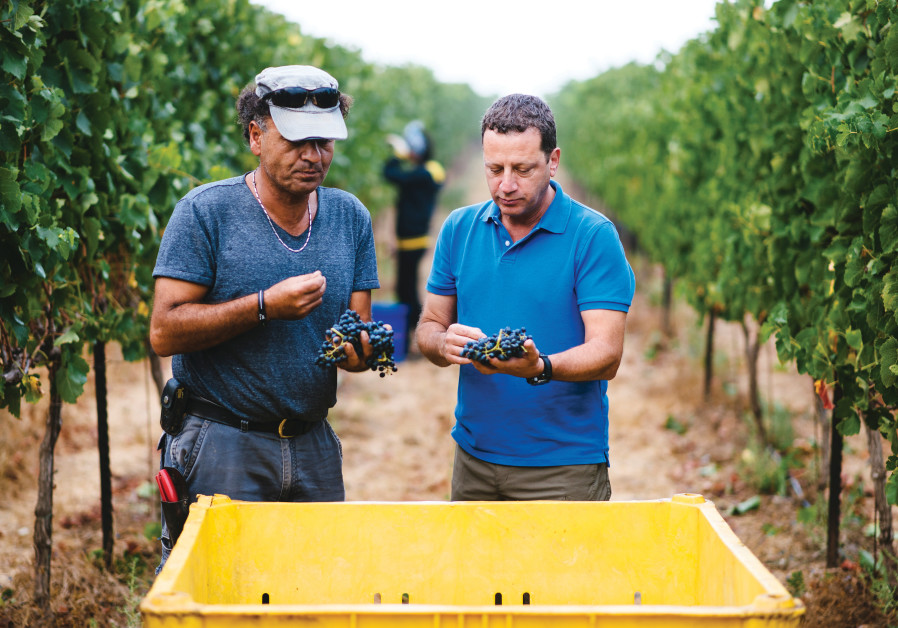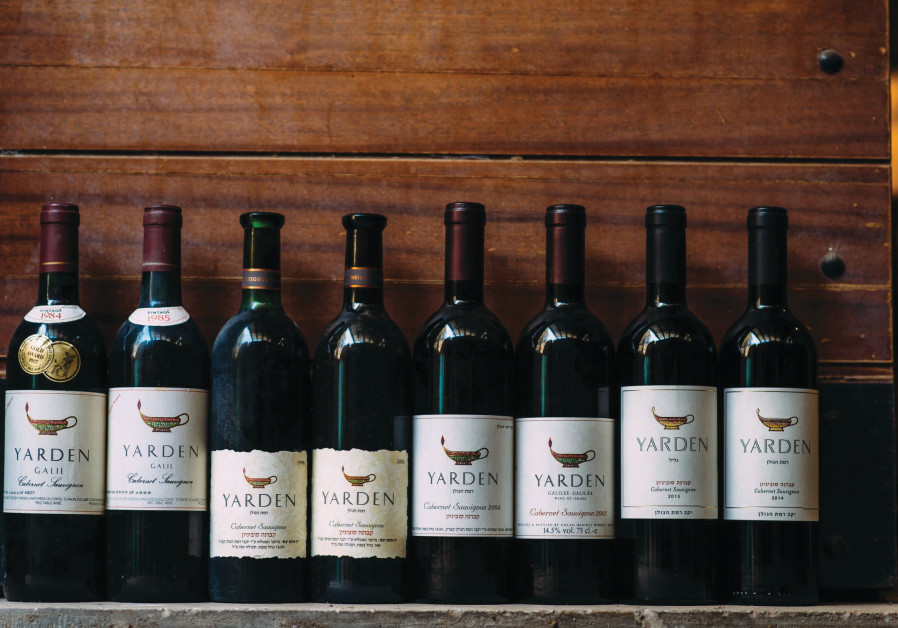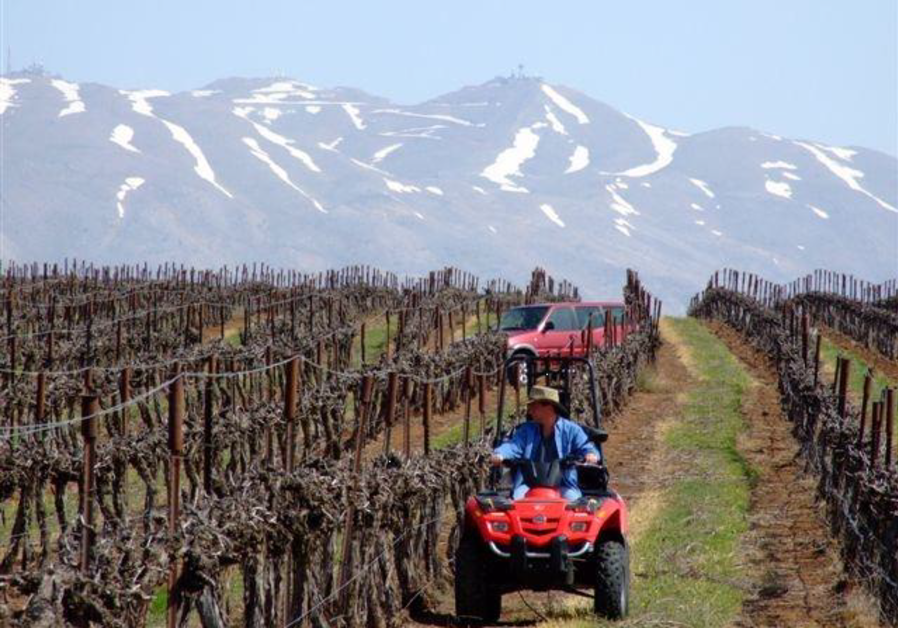It is now 30 years since Victor Schoenfeld arrived at the Golan Heights Winery.
Originally appointed head winemaker for a three-year term, he has over his long career become a legendary figure in Israeli wine. During this time, Israel has emerged from being a backward wine country to joining the family of quality wine-producing nations.
If the Golan Heights Winery has been at the center of the wine revolution here, then it is Victor Schoenfeld who has been the beating heart of the winery.
A fundamental reason for his success is that his dedication, work ethic and professionalism are unmatched. His ongoing pursuit of excellence and authenticity is as great today as it was in 1991. Despite his having a database of vineyard information that any winery in the world would envy, the desire for still more information never seems to be sated.
Sometimes he and his winemaking team say, “Just think, only five years ago we knew nothing.” Such is the weight of new information, developing technology and ongoing learning. Victor maintains an intense curiosity to still dig and delve, even though the Golan Heights is the most researched agricultural land in Israel. Paradoxically, he explains that the more information he has at his fingertips, the more it allows him to enable the vine to speak for itself. He wants the wine to represent the terroir, not the winery or the winemaker.Over the 30 years, Victor has remained the backbone and ballast of the winery and managed to keep it on message and focused. His first achievement on arrival was to create order and to introduce decision-making procedures and minimum standards at the winery. He has constantly innovated with new technology and has never been afraid to consult with leading international experts in their field. Always the pioneer, the winery was responsible for the first varietals of Syrah, Pinot Noir and Gewürztraminer (outside Latroun), the first Muscat Canelli, the first organically grown wine, one of the first single-vineyard wines, the first in the Moscato style, the first dessert wine made by cryo-extraction, the first Port-style wine from Portuguese varieties, the first wine made from carbonic maceration and so on. The list is endless. There is only so much space.

The Golan Heights Winery has consistently won major awards throughout Victor’s tenure. Its international recognition put Israel on the wine map. It was the first Israeli winery to be invited to the New York Wine Experience and the first to be listed in Wine Spectator’s Top 100. Wine Enthusiast Magazine chose the Golan as “Best New World Winery.” It received the Best Winery Award at Vin Italy, was awarded the Platinum Medal and 95 points at Decanter WWA, and four stars in Hugh Johnson’s Pocket Wine Book. Again, there is not enough space.
The wines Victor Schoenfeld is most associated with are Yarden Katzrin, Israel’s first cult wine; Yarden Cabernet Sauvignon, the flagship wine of the country; and Yarden Blanc de Blancs, Israel’s first-quality traditional-method sparkling wine. If I had to pin it down, I would call him the King of Cabernet and the Master of Sparkling Wines. However, that would not pay tribute to his versatility. He is the only Israeli winemaker who has gained third-party recognition at the very highest level for white, red, sparkling and dessert wines. He also maintains this excellence at different price points. For instance, Yarden Cabernet Sauvignon, Gamla Cabernet Sauvignon and Mount Hermon Red are each market leaders, positions they have held for many years.
THE GOLAN Heights Winery is now nearly a six million-bottle winery, and the head winemaker is responsible for a department of 26 people. These include five winemakers, viticulturists, wine growers and the laboratory team.
Victor is a slight person, with an upright stance and short, tight curly hair and an ever-youthful look. He has an iron will, and is an unforgiving perfectionist who will not settle for the mediocre. He will never do the minimum when he can do the maximum. As a person, he is not always easy and relaxed, does not suffer fools gladly, can’t abide laziness and holds others to his high standards. However, his is arguably the only Israeli winery that has built-in quality that may be passed on to the next generation in the manner of say, a Penfolds or Antinori.
He does not scatter words like confetti. Everything is considered and mulled over before you hear his opinion. In that split second before he answers a question, you can almost hear his mind whirring. On the other hand, he has a very dry sense of humor, with a comment often muttered as an aside that – unless you know him well – you will not realize he is joking.
He is at his happiest and in his element when cooking. The Schoenfeld family kitchen is lived in, rather like a galley kitchen with overflowing shelves on all sides. He putters around the kitchen, busy, yet fulfilled and cooking with total spontaneity. He never cooks the same dish twice and does not follow recipes, even though the shelves are creaking from the number of cookbooks.
In fact, food was his way into winemaking. He wanted to be a farmer and grow food. Fortunately for us, the 1980s was a nadir of commercial food production. Appearance, shelf life and distribution were then more important than flavor, individuality and a perception of quality. However, this was not true of viticulture or growing wine. He studied at UC Santa Cruz and UC Davis, and worked for wineries such as Robert Mondavi Winery in Napa Valley, Chateau St. Jean in Sonoma, Jacquesson et Fils in Champagne, and even squeezed in a year to manage a vineyard at Tishbi Winery in Israel.
The key to his love of wine is that he sees wine as a food, not a drink. Wine is to enjoy with a meal. He believes you have to be humble as a winemaker. He himself is the antithesis of the “I, me and mine” winemaker who loves to tell you what they have done and how good they are. With Victor, you have to prompt and almost squeeze it out of him. I once witnessed Japan’s most famous sommelier ask him, “Of the wines you make, which is your favorite?”

VICTOR’S CONTRIBUTION to the Golan is paramount, but he has also initiated important initiatives that will positively affect the whole industry. It is a fact that Israel’s vineyards are crippled by virus. Instead of bleating and wringing hands, the Golan Heights Winery created its own nursery and propagation block, partnering with world leaders ENTAV-INRA. The primary reason is to provide its own vineyards with clean plant material, however, a secondary benefit will be to supply the industry. This necessitated an astonishing investment by a winery, which was fraught with risk. Credit for the decision goes to the winery management. Success has many fathers, but the person who made the case for this long-term investment and successfully implemented this ambitious program was Victor Schoenfeld, and his team.
In 2012, IPEVO, the Israeli Professional Enology & Viticulture Organization, was founded. I have an inkling that Victor played a significant role in this initiative. In 2018, it was registered as a government nonprofit association. I have heard how valued it is by participating winemakers as a forum for sharing ideas and information. They recently published an Israel wine map, something the wine authorities have consistently failed to do. Certainly, IPEVO is an important new body on the Israeli wine scene.
Victor also volunteers his time as a member of the Wine Committee of the Standards Institution of Israel. The Wine Standards have recently been updated for the first time in ages. This is important ongoing work to bring the local wine industry up to speed.
Now the winery has taken another major step by moving to a program of sustainable vineyards. Yet again, the Golan Heights Winery is the pioneer, being the first Israeli winery to be internationally certified sustainable by the LODI RULES from California. Certified sustainable farming is all-encompassing and relates to the environment, the people and the business.
Victor says, “We hope to act as a model for others in the Israeli wine industry in order to promote sustainability in our industry as a whole.”

Wine is an important industry in Israel. It is small but high profile. There is no other product that runs like a thread from the beginnings of the Jewish people and from the first contact with the Land of Israel until today. Hi-tech may be larger, but you can’t give a bottle of hi-tech as a gift. If Israeli wine were a team in the Olympics, Victor Schoenfeld would be carrying the flag. No doubt, he is the Golan Heights Winery personified, but he is also an Israeli treasure. The quality, consistency, long-term approach and hunger to learn more are a beacon for everyone else in the industry.
Given his long-term success, his ability to maintain the pursuit of quality over so many years, and his overall contribution to the industry, I can think of no-one else who symbolizes all the positive developments quite like him. It is long overdue that the Israel Prize would recognize Israeli wine and in my opinion, Victor Schoenfeld would be the candidate who most represents the incredible achievements.
